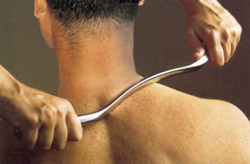Graston Technique / Instrument-Assisted Soft Tissue Mobilization (IASTM)
 The Graston Technique® is a specialized form of instrument-assisted soft tissue mobilization (IASTM) that uses stainless steel tools to detect and treat scar tissue, adhesions, and fascial restrictions. Originally developed for athletic injuries, this technique is now widely used to help patients recover from both acute and chronic soft tissue conditions.
The Graston Technique® is a specialized form of instrument-assisted soft tissue mobilization (IASTM) that uses stainless steel tools to detect and treat scar tissue, adhesions, and fascial restrictions. Originally developed for athletic injuries, this technique is now widely used to help patients recover from both acute and chronic soft tissue conditions.
What It Is
Using precisely designed instruments, your provider gently glides the tools over your skin to identify and treat restricted or injured tissue. The instruments allow for deeper, more sensitive palpation than the hands alone, helping target areas that may not be accessible with traditional manual therapy. Their concave and convex edges are shaped to fit the body’s contours, making treatment both effective and comfortable.
Who It Helps
Graston Technique / IASTM can be effective for many of the conditions we treat, including:
- Neck and back pain
- Shoulder pain and rotator cuff injuries
- Elbow pain, including golfer’s and tennis elbow
- Wrist and hand pain, including carpal tunnel syndrome
- Hip and knee pain
- Foot and ankle conditions, including plantar fasciitis and Achilles tendinopathy
- Muscle strains and joint sprains
- Chronic stiffness and postural dysfunction
- Sports injuries and repetitive strain injuries
- Scar tissue from previous injuries or surgeries
What to Expect
During your session, your provider will use the instruments to assess the texture and mobility of your soft tissues, then apply specific strokes to break down adhesions, stimulate circulation, and promote healing. Patients often describe a mild scraping or pressure sensation, sometimes followed by temporary redness in the treated area. Many notice improved mobility and decreased discomfort within just a few sessions.
Precautions
Graston Technique is safe for most patients but may be avoided or modified for individuals with certain conditions, such as severe osteoporosis, open wounds, unhealed fractures, or active skin infections. Your provider will review your health history to ensure this treatment is appropriate for you.

